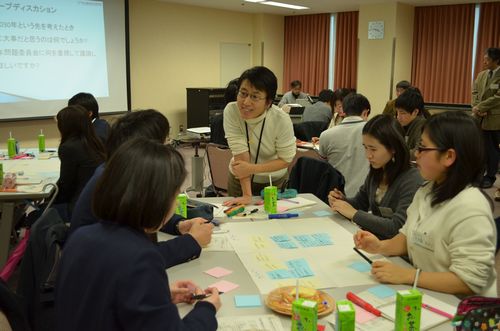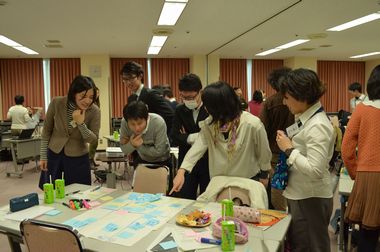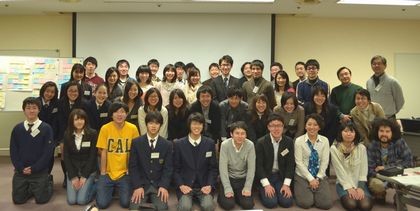July 24, 2012
Listening to the Voices of the Young Who Will Lead Society in 2030 -- A Meeting to Consider Energy Issues from the Perspective of Today's Youth
Keywords: Newsletter
JFS Newsletter No.118 (June 2012)

Copyright Institute for Studies in Happiness, Economy and Society
The Japanese government set up the Fundamental Issues Subcommittee on Japan's energy mix as an advisory panel to the Minister of Economy, Trade and Industry, created under the Agency for Natural Resources and Energy to formulate the new Strategic Energy Plan. The subcommittee consists of 25 members, of which only four, including myself, are women. To convey specifically the views of and opinions of women to the Fundamental Issues Subcommittee, I organized a meeting on January 31, 2012, to consider energy issues from the viewpoint of women, with nearly 100 of them attending. I voluntarily hosted the meeting because the Fundamental Issues Subcommittee did not host such a meeting.
Japan's Strategic Energy Plan under Review after 2011 Nuclear Disaster
In this article, I report on another meeting that I hosted to consider energy issues from the viewpoint of young people in their teens and twenties on March 17, 2012.
In terms of age structure, the membership of the Fundamental Issues Subcommittee is heavily biased towards the older generation. Of all the subcommittee members, 64 percent are over 60 years old, with none under the age of 39, which makes it difficult for the voices of young people to be heard. (In Japan, about 30 percent of the population is over 60 and about 40 percent is under the age of 39.) While it is true that there are benefits to making use of the experience and wisdom of elders, I think we also need to listen to the voices of young people in their teens and 20s who will be leading society in 2030, because the future of our nation's energy will affect every person in Japan. So discussions among various people of every age -- both male and female -- should be conducted, and their opinions should be reflected in the policymaking process.
This time, I voluntarily hosted, again, a meeting to consider energy issues from the viewpoint of young people, which was attended by 34 participants. Of those, 12 were high school students, 17 were undergraduate and postgraduate students, and five were in their teens and 20s who have jobs. At the meeting, they were divided into groups, and they discussed a variety of topics over three hours, including: "Why is it important to think about energy?" "What should Japan's future energy mix be, and why?" and "What are the most important things to consider when thinking about the future in 2030?" After the discussion, they shared their comments and opinions with the whole group.

Copyright Institute for Studies in Happiness, Economy and Society
About six members from the secretariat of the subcommittee participated and listened to the discussions among the young people on how far Japan should be developed and the relationship between happiness and economic growth, which even included high school students sharing their opinions. At the end, the young people were asked to write letters to Economy, Trade and Industry Minister Yukio Edano and the subcommittee.
During the discussion with the young people, many urged that we first start thinking about what kind of society we would like to build, rather than just talking about the energy supply. Here are some of their comments: "When we think about energy, the most important questions are: 'What sort of society will Japan aim for in the future?' 'What will give people happiness?' 'I wish that a system would be built that can still be used 100 years from now from the perspective of sustainability. Near-term growth may stagnate, but we should think about what we can do now for true growth that will be good for people 50 or 100 years from now.'" Some participants also requested things that they thought were needed, such as "a society in which we can choose our energy source" and "a policy that does not invite trouble in the future, unlike fossil or nuclear fuels."
In the subcommittee, the members tend to discuss what the energy mix ratio should be, such as "nuclear power: X%, renewable energy: Y% and fossil fuels: Z%." But before that, we should think about our ideal vision of society and a fundamental approach toward energy (the extent of choices and if they are distributed or centralized). We genuinely felt empathy for the young people urging us to think about these issues.
After the discussion, we received comments such as: "It was a wonderful opportunity to talk enthusiastically with people of the same generation about the future. Also, many observers, especially the policymakers of Japan, were present and listened attentively to our opinions. It seemed that this meeting was not just another exercise, but that it was worthwhile." "I hope the opinions of the young generation will be reflected in the formulation of energy policy in Japan." And "I would like to have more opportunities for this kind of dialogue in the future!"

Copyright Institute for Studies in Happiness, Economy and Society
The following are actual quotes from the young people who participated in the event.
"To Minister Edano and Members of the Fundamental Issues Subcommittee,
"What I would like you to think about first is the energy that can be handed down to our generation. We don't have time to think about this issue at school. That is why we wish to have more time to think about and discuss it." (Age 18)
"To think about our energy and how to deal with the issue is very important for Japan, especially since experiencing March 11, to plan for the future. We must have extensive opportunities for citizens all around Japan to discuss this issue, taking much time. Let's discuss the issue." (Age 23)
"Much should be thought about as Japan draws up its future energy policy plan. However, I would like to highlight the points which should not be forgotten: the importance of dialogue with citizens and coexistence with the nature. First, in order to build a trustworthy relationship, a venue for dialogue with citizens is essential. Next, whatever issues lie ahead, coexistence with nature is of the utmost importance. I would like this process to keep on going." (Age 21)
"From now on, I think energy issues in Japan will continue to be more and more serious day after day. When a policy is chosen to promote a certain measure, I would like to know clearly what purpose and advantages it has. I want the government to draw up a better policy by taking young people's voices into consideration, because we are the ones who will live in Japan in the future." (Age 16)
"What I want you to think about first in discussing future energy is sustainability, not to mention coexistence with the nature, so please make a system that can still be used in 100 years time. This may hinder immediate growth, but I hope it will be in a true sense of growth that will be good for those who are alive in 50 and 100 years from now. I look forward to realizing the unlimited potentials of natural energies." (Age 17)
I really hope these voices and wishes of young people will lead to future citizens' dialogues and the formulation of a constructive energy policy.
Reference:
http://www.es-inc.jp/lib/writing/kenjinnome/120412_151749.html (In Japanese)
http://ishes.org/news/2012/inws_id000346.html (In Japanese)
Written by Junko Edahiro
Related
"JFS Newsletter"
- 'Good Companies in Japan' (Article No.4): 'Eightfold Satisfaction' Management for Everyone's Happiness
- "Nai-Mono-Wa-Nai": Ama Town's Concept of Sufficiency and Message to the World
- 'Yumekaze' Wind Turbine Project Connects Metro Consumers and Regional Producers: Seikatsu Club Consumers' Co-operative
- Shaping Japan's Energy toward 2050 Participating in the Round Table for Studying Energy Situations
- 'Good Companies in Japan' (Article No.3): Seeking Ways to Develop Societal Contribution along with Core Businesses


